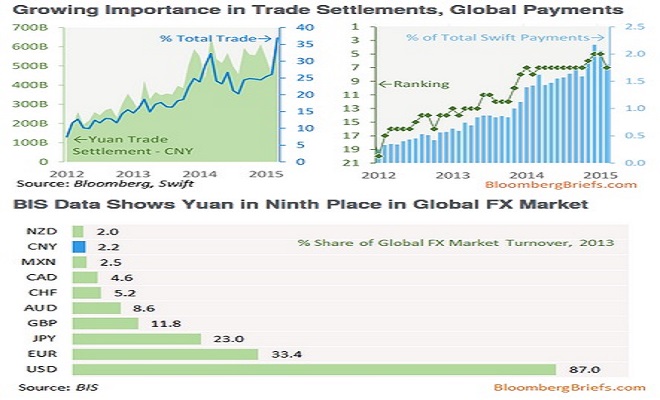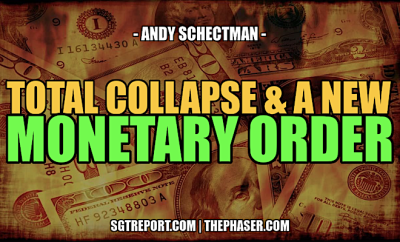 Zero Hedge
Zero Hedge
Economy
Gates Says Bet On Yuan As IMF Calls Currency Fairly Valued
from Zero Hedge:
We’ve talked extensively about China’s currency conundrum which has put Beijing between a rock and a hard place as it seeks to combat rapidly decelerating economic growth (which, according to some estimates, is running as low as 3.8%). Facing rising capital outflows (totalling $300 billion over the past four quarters alone) on the one hand and falling exports on the other, there appears to be no ‘right’ answer, as devaluing the yuan to prop up exports risks throwing gasoline on the capital outflow fire, but failing to devalue in the face of a dramatic slowdown in the export-driven economy may ultimately prove to be completely untenable. This is all complicated by recent strength in the dollar and perpetual pressure on the euro and yen exerted by the potent one-two monetary insanity punch from the Draghi-Kuroda tag team. Meanwhile, China is keen to give the yuan a more prominent role in the global economy via the AIIB and Silk Road Fund and is also pushing for SDR inclusion by the end of the year.
Against this backdrop, the IMF is out suggesting that the currency — which, as we have noted on multiple occasions over the past several months, has appreciated to the tune of 14% on a REER basis in the last 12 or so months — is closing in on being fairly valued. Predictably, Washington does not agree. Here’s more from WSJ:
The International Monetary Fund is close to declaring China’s yuan fairly valued for the first time in more than a decade, a milestone in the country’s efforts to open its economy that would blunt U.S. criticism of Beijing’s currency policy.
The fund’s reassessment of the yuan—set to be made official in IMF reports on China’s economy due out in the coming months—follows years of IMF censure of Beijing’s management of the currency.
The IMF’s latest view undermines the Obama administration’s pressure on China over its management of the currency and could undercut congressional efforts to inject yuan concerns into pending trade legislation.
“It takes the rug out from under the feet of U.S. critics of Chinese currency policy,” saidEswar Prasad, a Cornell University economist and former China official at the IMF. “The U.S. relied to a significant extent on what was seen as the IMF’s objective assessment.”
The Obama administration disagrees with the IMF, maintaining a view that the yuan, also called renminbi, remains “significantly undervalued.”
The shift at the IMF comes as Beijing is increasingly challenging the established global order. In recent months, China has won broad support for its new Asian Infrastructure Investment Bank, an entity that would rival the World Bank, the IMF’s sister institution. China is also pushing plans to create a modern “Silk Road” by better connecting its economy with those in the rest of Asia, the Middle East, Africa and Europe. Chinese officials have asked the IMF to include the yuan in the elite basket of currencies that comprise the fund’s emergency-lending reserves, a decision the fund will consider later this year.
The yuan is roughly pegged to the dollar, and as the U.S. currency has appreciated against most other major currencies, it has helped push up the value of the yuan. In nominal terms, the yuan’s appreciation has leveled off. But accounting for inflation, the value of the currency has risen by more than 10% in the past year alone.
As China’s economy cools, some economists don’t rule out Beijing depreciating the yuan again to help juice exports and prop up its expansion.
Here’s a bit of color from Barclays on what SDR inclusion means for Beijing in terms of flexibility to devalue…
On a fundamental basis, the case can be made that China’s “reluctant easing” should include a more significant move in the currency, but our view is that, ahead of the SDR review later this year, China will refrain from devaluing the CNY and even from moving USDCNY fixings notably higher. Such moves might not be welcomed by China’s major trade partners, who might be inclined to see it as currency manipulation.
…and here’s a look at the yuan’s rising importance in global trade…
What the above underscores is that although Beijing faces some tough choices in terms of whether or not China will eventually be forced, by slumping economic growth, to devalue, the evidence continues to mount that the yuan will play an increasingly important role in the world economy going forward, an eventuality that try as it may, the US will not be able to head off by branding the country a “currency manipulator.”
And meanwhile…
- BILL GATES SAYS `PROBABLY WOULD PICK’ CHINESE CURRENCY: CNBC
- GATES SAYS HE LOVES DOLLAR, WOULD PUT HIS BET ON YUAN



















